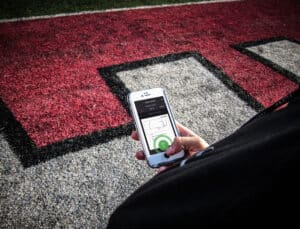Football Play Calling System: A Winning Strategy for Coaches
Reading Time: 10 minutes
Reading Time: 10 minutes
Football games can hinge on a single decision. The right football play-calling system is what turns strategy into results on the field.
Plays don’t equate to success alone. You need a structure that fits your players and lets you adapt to situations so you can communicate clearly when things get tense.
Luckily, modern tools now make it easier to streamline communication and speed up practice.
This article covers the basics of advanced football play calling systems and dives into how they work, why they matter, and how GoRout gives your team a competitive edge.
Key Takeaways
Effective football play calling really comes down to how well you know your players, the opponent, and the situation.
Finding a balance between staying aggressive and playing it safe usually leads to the best results.
A strong system helps you adapt quickly. You can switch plays based on the score, time, field position, or situation and keep your team in rhythm.
Building a clear, organized football playbook gives your players a common language and makes it easier to teach new plays.
Key points to remember:
- Know your team’s strengths and weaknesses
- Study opponent tendencies through film
- Adjust calls based on game flow and player condition
- Use run and pass plays to be unpredictable
- Keep communication simple and consistent
GoRout Gridiron and Scout are two of the top football play calling systems out there. They help you run more efficient practices, improve communication, and get more reps done in less time.
If you want to give your team an edge, get a quote and see how these solutions fit your program.
The Basics Of A Football Play Calling System

A football play-calling system is the structured language and process coaches use to communicate plays to players during a game or practice. It combines terminology, formations, and signals so your team can quickly understand and execute the plan on the field.
You rely on this system to keep everyone aligned. Without it, players will hesitate, miss assignments or waste time at the line.
A clear system cuts confusion and helps your team stay focused.
A typical play call includes:
- Formation – where players line up
- Motion/shift – movement before the snap
- Play type – run, pass, or special play
- Protection scheme – blocking assignments
- Snap count – when the ball is hiked
Choosing the right football play calling system matters. It affects speed, adaptability, and how quickly your players pick things up.
Some coaches love detailed calls. Others want short, fast signals for up-tempo play.
Modern tools like GoRout’s football practice device can support your system by improving communication during practice. You can test calls in real time and get your players ready for game day.
Common Challenges In Football Play Calling

You deal with plenty of challenges when calling plays, especially when every second counts. Quick decisions can mean the difference between gaining yards and losing the ball.
The complexity of managing offense, defense, the clock, and other scenarios in the game puts real pressure on your judgment. Communication breakdowns are one of the biggest headaches. If someone on the offensive line or in the backfield misses a signal, the whole play can fall apart.
Adapting to the defense on the fly is another hurdle. A defensive shift or a surprise blitz can force you to adjust protection schemes in seconds. If you don’t, your quarterback might end up under pressure or worse, turning the ball over.
Managing fatigue and injuries adds another layer. Rotating players at the right time keeps your offense sharp, but pulling the wrong guy can mess up protection or throw off your rhythm.
To stay ready, you’ve got to anticipate a bunch of scenarios. That means prepping two or three backup calls for every situation, like short-yardage runs, deep passes, or plays for clock management.
Clear sideline-to-field communication is vital. Wearable technology can help cut confusion during both practice and games.
How GoRout Transforms Football Play Calling
GoRout gives you advanced sports tech to speed up communication, cut down wasted time, and help your players perform their best.
With its real-time coach-to-player communication system and wearable devices, you can send plays instantly and win on the field without confusion or delays.
“With traditional signals, we’d have a few plays each game where someone missed the signal or wasn’t lined up correctly. Since implementing GoRout, we’ve only had one missed signal in two games – an efficiency improvement that’s just incredible for us.” – Coach Daniel Puckhaber, St. Lawrence University (2024)
GoRout Scout

GoRout Scout helps you run more efficient practices by sending digital scout cards straight to player devices. No more flipping through paper cards or shouting out instructions.
You prepare plays using the web app and send them to players instantly with a tap on your mobile device.
That means your team gets more reps in less time. You can organize practices, adjust plays on the fly, and keep players engaged.
Coaches say they triple their reps per session because players aren’t standing around waiting for instructions.
Key benefits include:
- Instant play delivery without paper cards
- Faster adjustments during drills
- More reps in less practice time
- Clear communication for every position
If you want to modernize your practice, you’ll enjoy the integrated football playbook software that makes it easy to manage plays and track progress.
GoRout Gridiron

GoRout Gridiron brings that real-time communication into live games. Instead of hand signals or sideline boards, you send secure play calls right to football play call wristbands on the field.
It keeps your strategy private and cuts down on sign stealing. Players get the call instantly through a small display and a vibration alert. That means quicker huddles and fewer mistakes.

With Gridiron, you can:
- Send plays in seconds during games
- Avoid miscommunication under pressure
- Keep opponents guessing by hiding signals
- Support all 22 positions at once
This system keeps you flexible and lets you make quick adjustments. Your team gets a real edge when every second matters.
Developing An Effective Play Calling System With GoRout

You build a strong football play-calling system by first figuring out what your players do best. Look at speed, size, and decision-making for each position and see how they fit your playbook.
As an offensive coordinator, you want to match skills with roles so nobody gets forced into something that doesn’t fit.
Charting each player’s strengths and weaknesses is a simple step that helps you find patterns and design plays around your team’s natural advantages.
Integrating GoRout into your coaching workflow
GoRout gives you tools to speed up communication and cut confusion in practice and games. Instead of hand signals or paper cards, you just send plays straight to player devices.
Your team stays aligned, and you cut down on wasted time. Using football coaching software lets you organize practice scripts and edit plays on the fly, keeping everyone on the same page.
That means less time on logistics and more time teaching.
Customizing play calls to fit your play schemes
Your play-calling system works best when it fits your schemes.
For offense, keep a balance between run and pass to stay unpredictable. For defense, adjust calls based on field position and game situations.
With GoRout, you can adapt quickly. If a player gets injured or tired, you send a new call directly to the field, no delay.
That flexibility keeps your playbook useful in real-time competition.
“I’ll use GoRout no matter where I coach for the rest of my career. It’s phenomenal!” – Coach Brian Lowery, Eastern View High School (2024)
Building A Winning Strategy With GoRout’s Football Play Calling System

You need a system that keeps your playbook clear and easy to grab during fast-paced moments. GoRout lets you organize plays by down, distance, or field position so you can find the right call fast.
This way, you stay focused on executing instead of flipping through notes. A simple structure might look like this:
| Situation | Example Play Type | Goal |
| 3rd & Short | Inside Run | Secure first down |
| Red Zone | Quick Slant | Fast score attempt |
| 2-Minute Drill | No-Huddle Pass | Manage clock, advance |
Including formations, motions, and plays efficiently
Your offense runs best when players know their roles. With GoRout, you send formations, motions, and adjustments instantly to each player’s device. That keeps everyone on the same page and cuts confusion.
When you run drills like 7 on 7 football, this efficiency gets even more important for teaching spacing, timing, and communication in your scheme.
Using GoRout’s tools to simplify complex playbooks
Complex playbooks can overwhelm younger players or backups. GoRout’s scripting and on-field apps let you break down plays into smaller, teachable chunks.
You can edit or flip plays on the spot, giving your team flexibility without slowing down practice. This approach helps you adapt your scheme to player strengths while still keeping your run and pass options balanced.
Football Play Calling Strategies To Maximize Performance

Keep your team’s play calls clear and concise. Using word associations or short codes lets players recognize plays quickly, cutting down confusion and saving those precious seconds on the field.
Mixing running plays and passing plays keeps defenses on their toes. If you run the ball too much, defenses crowd the line. Pass too often, and they’ll drop back into coverage.
Switching things up creates rhythm and opens space for your quarterback, receivers, tight ends and backs. Play action and misdirection take it further.
When you fake a run and call a pass, defenders hesitate just long enough for your receivers to get open. Even a short gain from play action can shift momentum and force the defense to rethink their approach.
Advanced football practice equipment like GoRout improves communication. Players check the wristband for the call and formation, including their job responsibilities. There’s no need for extra huddles, so everything moves faster.
Improving Football Coaching Staff Collaboration
Good collaboration among your coaches leads to smarter decisions and smoother practices. When the head coach, coordinators, and assistants share insights quickly, confusion drops, and the whole staff stays on the same page
Clear, direct feedback during practice lets you adjust plays without wasting time. A structured football practice plan makes sure every coach knows their job for the day.
Offensive and defensive coaches have to sync up, too. If the offensive coordinator wants a no-huddle series, the defensive staff should prepare for the faster tempo.
This kind of awareness balances workloads and keeps both sides ready.
Define responsibilities clearly for better collaboration.
| Role | Key Responsibility |
| Head Coach | Final decision-making, game flow |
| Offensive Coach | Play design, tempo management |
| Defensive Coach | Matchups, adjustments |
| Special Teams | Field position, clock management |
Creating A Winning Culture With Your Play Calling System
Your system works best when the team actually believes in it. Trust grows when calls stay clear, consistent, and fit your players’ strengths.
If athletes see your philosophy lines up with what they can do, they’ll buy in and commit to executing with confidence.
- Share why you make key calls
- Ask leaders for their input
- Show players how the system supports their roles
Fostering discipline and execution
Discipline forms the backbone of a strong culture. Your system should push players to line up right and react fast, maintaining their focus even when things get stressful.
When everyone knows their job, mistakes drop and execution gets sharper.
- Practice signals and terminology often
- Hold players accountable for mental errors
- Reward sharp execution in practice and games
Celebrating successes and learning from mistakes
Your play-calling system should shape how your team reacts to results. Celebrate when things work, even the little wins, to keep morale up.
When there are mistakes, treat them as teaching moments instead of setbacks.
- Highlight smart decisions in a film review
- Praise teamwork after well-executed drives
- Use errors to tweak the playbook and improve your philosophy
Conclusion About Football Play Calling System
A football play-calling system helps you simplify decisions, communicate clearly, and adjust quickly on the field. By using structured methods, you reduce confusion and give your players the best chance to execute with confidence.
You benefit most when your system balances simplicity, adaptability, and speed. A good system lets you tailor plays to player strengths, adjust to game situations and stay unpredictable against defenses.
Here are a few things to keep in mind:
- Clarity is key: Use simple language so players understand instantly.
- Flexibility is king: Build in options that adapt to score, time and field position.
- Technology helps: Digital tools improve communication and reduce errors.
Modern tools like GoRout Scout and Gridiron give you reliable systems to streamline practice and in-game play calling. They make it easier to run more reps and prepare for different scenarios, keeping every player aligned.
If you want to improve your team’s strategy and communication, get a quote to see how they can fit your program’s needs.
FAQs About Football Play Calling Systems
How does football play-calling work?
You or your quarterback pick plays based on formation, defense, and the game situation. The call includes the formation and play type, sometimes including protection schemes as well. Each player learns their role from the coded language.
How to know what plays to call in football?
You decide by reading the defense, thinking about down-and-distance, and considering your team’s strengths. For example, if the defense crowds the line, a quick pass might be the better call.
How to break down a football play call?
A play call usually has formation + motion + assignment + cadence. Example: Trips Right, 36 Power, on Two. It tells players where to line up, what to do, and when to snap the ball.
What is the best way to signal in football plays?
You can use hand signals, wristbands, boards, or electronic devices. College and pro teams often mix methods to cut down confusion and stop opponents from stealing signals.
What are the key components of an effective football play-calling system?
- Clear terminology
- Balance of run and pass
- Flexibility to adjust mid-game
- Easy communication methods
- Consistency across the team
How does a systematic play-calling approach impact game outcomes?
A solid system helps you avoid errors, make quicker choices, and adjust on the fly. This usually results in smoother drives and better time management.
What are the psychological effects of structured play calling on players?
When players know the system, they feel more confident and focused. Consistency lowers stress and helps them react quickly under pressure.
What tools do coaches use for real-time strategy adjustments?
Coaches rely on tablets, headsets, video replay systems, and wearable devices during games. These gadgets let them break down defenses and tweak play calls on the fly.
They also make it easier to talk with players right when it matters most.







